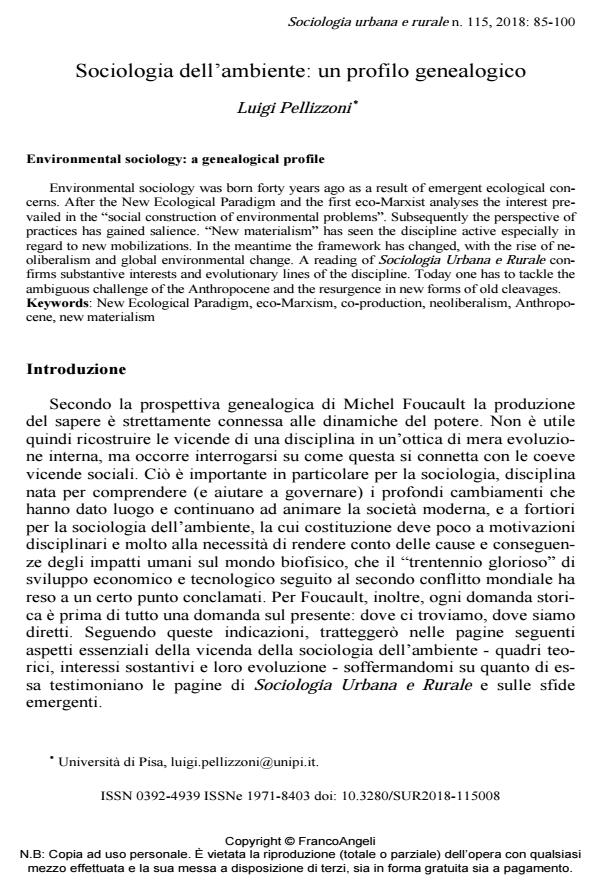Sociologia dell’ambiente: un profilo genealogico
Titolo Rivista SOCIOLOGIA URBANA E RURALE
Autori/Curatori Luigi Pellizzoni
Anno di pubblicazione 2018 Fascicolo 2018/115 Lingua Italiano
Numero pagine 16 P. 85-100 Dimensione file 178 KB
DOI 10.3280/SUR2018-115008
Il DOI è il codice a barre della proprietà intellettuale: per saperne di più
clicca qui
Qui sotto puoi vedere in anteprima la prima pagina di questo articolo.
Se questo articolo ti interessa, lo puoi acquistare (e scaricare in formato pdf) seguendo le facili indicazioni per acquistare il download credit. Acquista Download Credits per scaricare questo Articolo in formato PDF

FrancoAngeli è membro della Publishers International Linking Association, Inc (PILA)associazione indipendente e non profit per facilitare (attraverso i servizi tecnologici implementati da CrossRef.org) l’accesso degli studiosi ai contenuti digitali nelle pubblicazioni professionali e scientifiche
;
Keywords:New Ecological Paradigm, eco-Marxism, co-production, neoliberalism, Anthropocene, new materialism
- Arias-Maldonado M. (2013). Rethinking sustainability in the Anthropocene. Environmental Politics, 22(3): 428-446. DOI: 10.1080/09644016.2013.76516
- Asafu-Adjaye J., Blomqvist L., Brand S. et al. (2015). An Ecomodernist Manifesto. Disponibile al sito: http://www.ecomodernism.org/manifesto [accesso 30 Marzo 2016].
- Beck U. (1986). Risikogesellschaft. Frankfurt: Suhrkamp.
- Castree N., Adams W., Barry J. et al. (2014). Changing the intellectual climate. Nature Climate Change, 4: 763-768.
- Catton W., Dunlap R. (1978). Environmental sociology: a new paradigm. American Sociologist, 13(1): 41-49.
- Clark N., Yusoff K. (2017). Geosocial formations and the Anthropocene. Theory, Culture & Society, 34(2–3): 3–23. DOI: 10.1177/026327641668894
- Coole D., Frost S. (eds). (2010). New Materialisms. Durham, NC: Duke University Press.
- Crutzen P., Schwägerl C. (2011). Living in the Anthropocene: Towards a new global ethos. Yale Environment, 360. Disponibile al sito: http://e360.yale.edu/feature/living_in_the_anthropocene_toward_a_new_global_ethos/2363 [accesso 15 Dicembre 2017].
- Devall B., Sessions G. (1985). Deep Ecology: Living as if Nature Mattered. Salt Lake City, UT: Peregrine Smith.
- Douglas M., Wildavsky A. (1982). Risk and Culture. Berkeley, CA: University of California Press.
- Duncan O. (1964). Social organization and the ecosystem. In Robert F. (ed.). Handbook of Modern Sociology. New York: Rand McNally, 36-82.
- Dunlap R, Catton W. (1979). Environmental sociology. Annual Review of Sociology, 5: 243-273.
- Escobar A. (2010). Postconstructivist political ecologies. In Redclift M., Woodgate G. (eds.). The International Handbook of Environmental Sociology. Second Edition. Cheltenham: Elgar, 91-105. DOI: 10.4337/9781849805520.0001
- Fischer-Kowalski M. (1997). Society’s metabolism: On the childhood and adolescence of a rising conceptual star. In Redclift M., Woodgate G. (eds.). The International Handbook of Environmental Sociology. Second Edition. Cheltenham: Elgar, 119-137. DOI: 10.4337/9781843768593.0001
- Foster J.B. (2000). Marx’s Ecology. Materialism and Nature. New York: Monthly Review Press.
- Geels F., Kern F., Fuchs G. et al. (2016). The enactment of socio-technical transition pathways: a reformulated typology and a comparative multi-level analysis of the German and UK low-carbon electricity transitions (1990–2014). Research Policy, 45: 896-916.
- Goldman M., Schurman R. (2000). Closing the “Great Divide”: new social theory on society and nature. Annual Review of Sociology, 26: 563-84.
- Hajer M. (1997). The Politics of Environmental Discourse. Oxford: Oxford University Press.
- Hannigan, J. (1995). Environmental Sociology. London: Routledge.
- Jacques P., Dunlap R., Freeman M. (2008). The organisation of denial: conservative think tanks and environmental scepticism. Environmental Politics, 17(3): 349-385. DOI: 10.1080/0964401080205557
- Jasanoff S. (1999). STS and public policy: getting beyond deconstruction. Science Technology & Society, 4(1): 59-72. DOI: 10.1177/09717218990040010
- Jasanoff S. (2004).The idiom of co-production. In Jasanoff S., ed., States of Knowledge. The Co-Production of Science and Social Order. London: Routledge, 1-12.
- Latour B. (2005). Reassembling the Social. Oxford: Oxford University Press.
- Meadows D.H., Meadows D.L., Randers J., Behrens W.W. (1972). The Limits to Growth. New York: New American Library.
- Minervini D. (2013). Governance in a bottle. In Zapata M.J., Hall C.M. (eds.). Organising Waste in The City. International Perspectives on Narratives and Practices. Bristol: Policy Press, 99-120.
- Mol A.P.J. (1997). Ecological modernization: industrial transformations and environmental reform. In Redclift M., Woodgate G. (eds.). The International Handbook of Environmental Sociology. Second Edition. Cheltenham: Elgar, 138-149. DOI: 10.4337/9781843768593.0001
- Moore J. (2011). Transcending the metabolic rift: a theory of crises in the capitalist world ecology. Journal of Peasant Studies, 38(1): 1-46. DOI: 10.1080/03066150.2010.53857
- Mythen G. (2007). Reappraising the risk society thesis: telescopic sight or myopic vision? Current Sociology, 55(6): 793-813.
- O’Connor J. (1973). The Fiscal Crisis of the State. New York: St. Martin’s Press.
- Pellizzoni L. (2013). Une idée sur le déclin? Evaluer la nouvelle critique de la délibération publique. Participations, 3(2): 87-118.
- Pellizzoni, L. (2016) Ontological Politics in a Disposable World: The New Mastery of Nature. London: Routledge.
- Puig de la Bellacasa M. (2011). Matters of care in technoscience: assembling neglected things. Social Studies of Science, 41(1): 85-106. DOI: 10.1177/030631271038030
- Rosa E., Machlis G., Keating K. (1988). Energy and society. Annual Review of Sociology, 14: 149-172.
- Schlosberg D., Coles R. (2016). The new environmentalism of everyday life: sustainability, material flows and movements. Contemporary Political Theory, 15(2): 160-181.
- Schmidt A. (1971). The Concept of Nature in Marx. London: Verso.
- Schnaiberg A. (1975). Social syntheses of the societal-environmental dialectic: the role of distributional impacts. Social Science Quarterly, 56: 5-20.
- Schnaiberg A. (1980). The Environment: From Surplus to Scarcity. New York: Oxford University Press.
- Shove E., Watson M., Spurling N. (2015). Conceptualising connections: energy demand, infrastructures and social practices. European Journal of Social Theory, 18(3): 274-287. DOI: 10.1177/136843101557996
- Struffi L. (2001). Lezioni di sociologia dell’ambiente. Trento: Università degli Studi di Trento.
- Thacker E. (2007). The Global Genome. Cambridge, MA: MIT Press.
- WCED (World Commission on Environment and Development) (1987). Our Common Future, Oxford: Oxford University Press.
- Williams R. (1980). Ideas of nature. In Id. Problems in Materialism and Culture. London: Verso, 67-85.
- Quantitative Sustainability Giovanni Carrosio, pp.139 (ISBN:978-3-031-39310-5)
Luigi Pellizzoni, Sociologia dell’ambiente: un profilo genealogico in "SOCIOLOGIA URBANA E RURALE" 115/2018, pp 85-100, DOI: 10.3280/SUR2018-115008